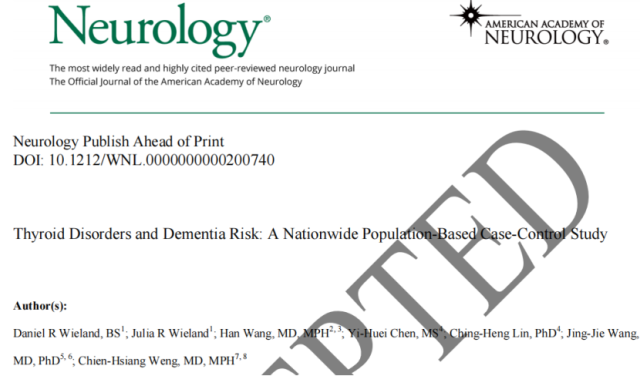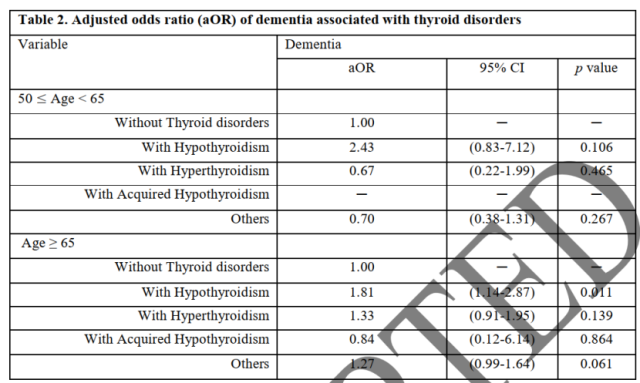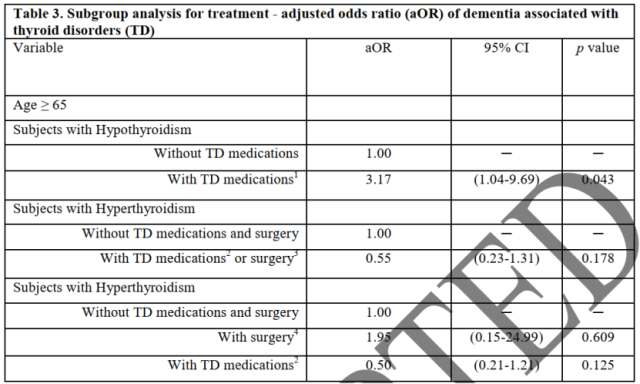Could hypothyroidism lead to a surge in dementia risk?
- Normal Liver Cells Found to Promote Cancer Metastasis to the Liver
- Nearly 80% Complete Remission: Breakthrough in ADC Anti-Tumor Treatment
- Vaccination Against Common Diseases May Prevent Dementia!
- New Alzheimer’s Disease (AD) Diagnosis and Staging Criteria
- Breakthrough in Alzheimer’s Disease: New Nasal Spray Halts Cognitive Decline by Targeting Toxic Protein
- Can the Tap Water at the Paris Olympics be Drunk Directly?
Could hypothyroidism lead to a surge in dementia risk?
- Should China be held legally responsible for the US’s $18 trillion COVID losses?
- CT Radiation Exposure Linked to Blood Cancer in Children and Adolescents
- FDA has mandated a top-level black box warning for all marketed CAR-T therapies
- Can people with high blood pressure eat peanuts?
- What is the difference between dopamine and dobutamine?
- How long can the patient live after heart stent surgery?
Could hypothyroidism lead to a surge in dementia risk?
Dementia is an umbrella term used to describe neurodegenerative diseases that cause cognitive dysfunction, among other things.
An estimated 36.5 million people worldwide suffered from dementia in 2010, with a prevalence of 5 to 7 percent in people aged 60 and over in most regions, and this number is increasing, doubling every 20 years [1] ].
Researchers have been actively exploring the risk factors associated with dementia. In addition to carrying risk genes, lifestyle and other factors, there is also a strong link between hormone expression levels and cognitive impairment .
Recently, a research team published the latest research results in the journal Neruology [2], exploring the correlation between dementia and thyroid disease.
The study found that in patients 65 and older, a history of hypothyroidism was associated with an 81% increased risk of dementia, while those who had taken related drugs had a 217% increased risk of dementia compared with those who had not taken thyroxine replacement drugs !
The study provided tertiary evidence that a history of hypothyroidism was associated with an increased risk of dementia in patients 65 years of age and older.

Most thyroid diseases are autoimmune diseases, and in recent decades, people have gradually begun to pay attention to the health effects of thyroid hormones T3 and T4, as well as the nutritional thyroid-stimulating hormone.
The prevalence of hyperthyroidism and hypothyroidism was 0.2-1.3% and 1-2%, respectively, while the prevalence of hypothyroidism was in the two age groups 85-89 years and 23-25 years old It rose significantly to 7% . Women are more prone to thyroid disease than men.
Thyroid hormones play important roles in embryonic, postnatal, and adult nervous system development, and can affect cognitive function through multiple biochemical and pathophysiological pathways.
With the rapid aging of some countries’s population, the prevalence of dementia is also gradually increasing, so it is very necessary to conduct further research.
To determine the relationship between a history of hyperthyroidism or hypothyroidism and the risk of developing dementia, researchers designed this population-based case-control study using the Taiwan Medical Insurance Database (NHIRD).
The researchers identified 34,387 patients in the NHIRD who were diagnosed with dementia between 2006 and 2013, each with proof of disease, three outpatient diagnoses/one inpatient diagnosis followed by an outpatient or inpatient diagnosis.
A total of 7843 dementia patients were included in the final study after excluding patients <18 years old, >120 years old, dead, diagnosed with syphilis, HIV and other infectious diseases or mental illnesses before the diagnosis of dementia .
Afterwards, the researchers selected 7843 non-demented patients in the Longitudinal Health Insurance Database (LHID) and matched case groups 1:1 by age, sex, and case index date.
Thyroid disorders include hyperthyroidism, hypothyroidism, and acquired hypothyroidism .
The diagnosis of thyroid disease also required three outpatient diagnoses/one inpatient diagnosis followed by another outpatient or inpatient diagnosis.
The first diagnosis in the patient group should have occurred one year before the first dementia diagnosis, and the first diagnosis in the control group should have occurred one year before the index date.
After adjusting for gender, age, history of hypertension, diabetes, coronary heart disease, depression, hyperlipidemia, alcohol dependence syndrome, tinnitus, hearing loss, and radioactive iodine therapy by logistic regression analysis, the history of thyroid disease and the occurrence of dementia were evaluated relationship between risks.

Adjusted odds ratios for thyroid disease-related dementia
The results of the analysis showed that the mean age of those with dementia was 74.9 years, and the mean age of those without dementia was 74.5 years.
In the case group, a total of 78 patients developed hypothyroidism (0.9%) and 76 patients developed hyperthyroidism (1.0%); in the control group, a total of 34 patients (0.4%) developed hypothyroidism and 57 patients (0.7%) developed hyperthyroidism .
In addition, the incidence of hypertension, diabetes, coronary artery disease, depression, and alcohol dependence in the case group was also significantly higher than that in the control group, which are known risk factors for dementia.
After adjusting for sex, age, known risk, and other factors mentioned above, the researchers found that a history of hypothyroidism was associated with an 81% increased risk of dementia in people 65 years and older (aOR 1.81) , while those 50-65 years old were associated with an 81% increased risk of dementia.
The association between the history of hypothyroidism and the risk of dementia was not significant (aOR 2.43, p=0.106) .
At the same time, the association between hyperthyroidism and acquired hypothyroidism and the risk of dementia was not statistically significant in people aged 50 and over.

Subgroup analysis of adjusted odds ratios for thyroid therapy-related dementia
In a subgroup analysis of people 65 years of age and older, hypothyroidism with drug treatment was associated with a 217% increased risk of dementia compared with drug- naïve patients (aOR 3.17) . According to the researchers’ analysis, these patients may have more obvious symptoms of hypothyroidism.
Previous studies on the relationship between thyroid disease and dementia have mostly focused on non-East Asian populations.
This is the first case-control study in a Taiwanese population , which will help us to further study the link between thyroid disease and dementia.
However, due to database limitations, researchers cannot know the severity of the disease and the exact time of disease progression, and specific clinical data are also lacking.
Considering the conflicting results of multiple studies on the association of thyroid hormones with dementia, the researchers believe that more carefully designed prospective longitudinal cohort studies should be conducted to elucidate the underlying mechanisms and relationships in order to better manage patients.
references:
[1] Sosa-Ortiz AL, Acosta-Castillo I, Prince M J. Epidemiology of dementias and Alzheimer’s disease[J]. Archives of medical research, 2012, 43(8): 600-608.
[2] Wieland DR, Wieland JR, Wang H, et al. Thyroid Disorders and Dementia Risk: A Nationwide Population-Based Case-Control Study[J]. Neurology, 2022.
Could hypothyroidism lead to a surge in dementia risk?
(source:internet, reference only)
Disclaimer of medicaltrend.org
Important Note: The information provided is for informational purposes only and should not be considered as medical advice.



